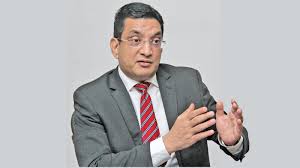-By LeN Diplomatic Editor

(Lanka-e-News -25.June.2025, 5.10 AM) In a remarkable twist that has prompted accusations of diplomatic duplicity, Ali Sabry PC, Sri Lanka’s former Foreign Minister, has come out strongly in favour of the U.N.-affiliated research vessel Dr. Fridtjof Nansen — despite having personally delayed a similar Chinese research ship in 2022 under far murkier circumstances.
This sudden moral farvour for multilateral oceanic research has raised eyebrows in Colombo and beyond, especially among those who recall the delicate balancing act Sri Lanka was forced to play between Beijing and New Delhi when the Chinese vessel Yuan Wang 5 sought clearance to dock at Hambantota Port three years ago.
From Caution to Zeal: Sabry’s Sudden Conversion
Speaking with the clarity of a man unburdened by political office, Mr Sabry this week insisted:
“Yes, Sri Lanka should allow the Dr. Fridtjof Nansen to enter our waters and proceed with its research mission as scheduled. This is a globally respected initiative under the UN’s auspices to assess marine sustainability and protect our fisheries.”
He went further, warning that any delay or denial of entry could cost the island nation “over $1 million in opportunity losses” and — more alarmingly — its “credibility and long-standing partnership with the FAO.”
The vessel, operated by the Norwegian Institute of Marine Research and funded by the UN Food and Agriculture Organisation (FAO), is due to survey Sri Lanka’s Exclusive Economic Zone (EEZ) as part of a regional marine ecosystem assessment. The mission, according to Mr Sabry, had been initiated “under our Government” in consultation with FAO and local fisheries officials.
So far, so noble.
However, critics are now asking: where was this clarity and commitment to science when Sabry himself, as Foreign Minister in 2022, delayed a Chinese research ship from entering the same Hambantota Port?
The vessel in question — a high-tech geospatial surveillance ship linked to China’s military — was granted port clearance only after considerable back-and-forth, reportedly due to Indian concerns. At the time, Mr Sabry’s ministry justified the delay by citing the need to verify the nature of the vessel’s mission and international sensitivities.
Now, the very same Ali Sabry is demanding that another research vessel, this time flying under the U.N. flag, be allowed swift entry — invoking principles of transparency, scientific necessity and international goodwill.
The contradiction has not gone unnoticed.
Lawmakers within the ruling National People’s Power (NPP) coalition have called for a formal inquiry into Mr Sabry’s 2022 conduct, questioning whether geopolitical alignment, personal interests, or foreign influence — particularly from India or the West — may have influenced his earlier decision.
One senior NPP source told The Lankaenews
“When the Chinese vessel was blocked, there was no clarity. There was no UN concern or global outrage. It was clearly a matter of political calculation. And now he wants to be seen as a defender of global science and multilateralism?”
Even more damning are whispers that Mr Sabry’s family considerations may have influenced his policy discretion. “It’s worth investigating,” the source said, “whether the then-foreign minister’s own son was preparing to apply for studies in the United States during that very period — and whether a diplomatic incident with China could have been avoided had he not been playing to Washington’s gallery.”
What rankles most among Sri Lanka’s China-friendly commentators is the perceived betrayal of a nation that has consistently backed Sri Lanka at the United Nations Human Rights Council. At the time, Beijing was one of the few global powers to support Colombo in Geneva, while India, the US and their allies urged accountability for wartime abuses.
“Is this how we repay that loyalty?” asked one former diplomat in Colombo. “When the Chinese ship came, Sabry hesitated. When the U.N. ship comes, he rolls out the red carpet. That’s not foreign policy — that’s amateur theatre.”
Sabry’s argument that rejecting the Dr. Fridtjof Nansen would portray Sri Lanka as “uncooperative with science-based, internationally recognised environmental assessments” is now being mocked by those who recall his 2022 position.
“What was China’s vessel doing if not marine research?” quipped an opposition MP. “Was it doing deep-sea cooking classes?”
Environmentalists and marine biologists, however, have largely sided with the U.N. mission, noting that the Nansen programme is widely respected and operates under transparent protocols. Still, the optics of Sabry’s transformation from cautious gatekeeper to scientific evangelist have complicated what should have been a straightforward diplomatic clearance.
The NPP Government has thus far remained silent on whether an investigation into the 2022 incident will be launched. But among diplomatic circles, the damage to Sabry’s legacy is already palpable.
“Ranil Wickremesinghe may have posed as Iran’s foreign minister in Saint Petersburg this week,” said one retired civil servant, “but it seems Ali Sabry is trying out for the UN’s spokesperson on marine ecology — after playing Washington’s man in Colombo for too long.”
As the Dr. Fridtjof Nansen prepares to enter Sri Lankan waters, the irony is unmistakable: a former minister who once delayed science in deference to politics is now invoking science to escape the politics of his past.
It remains to be seen whether the tide of public memory is as forgiving as the waters he now champions.
-By LeN Diplomatic Editor
---------------------------
by (2025-06-24 23:44:13)
Leave a Reply